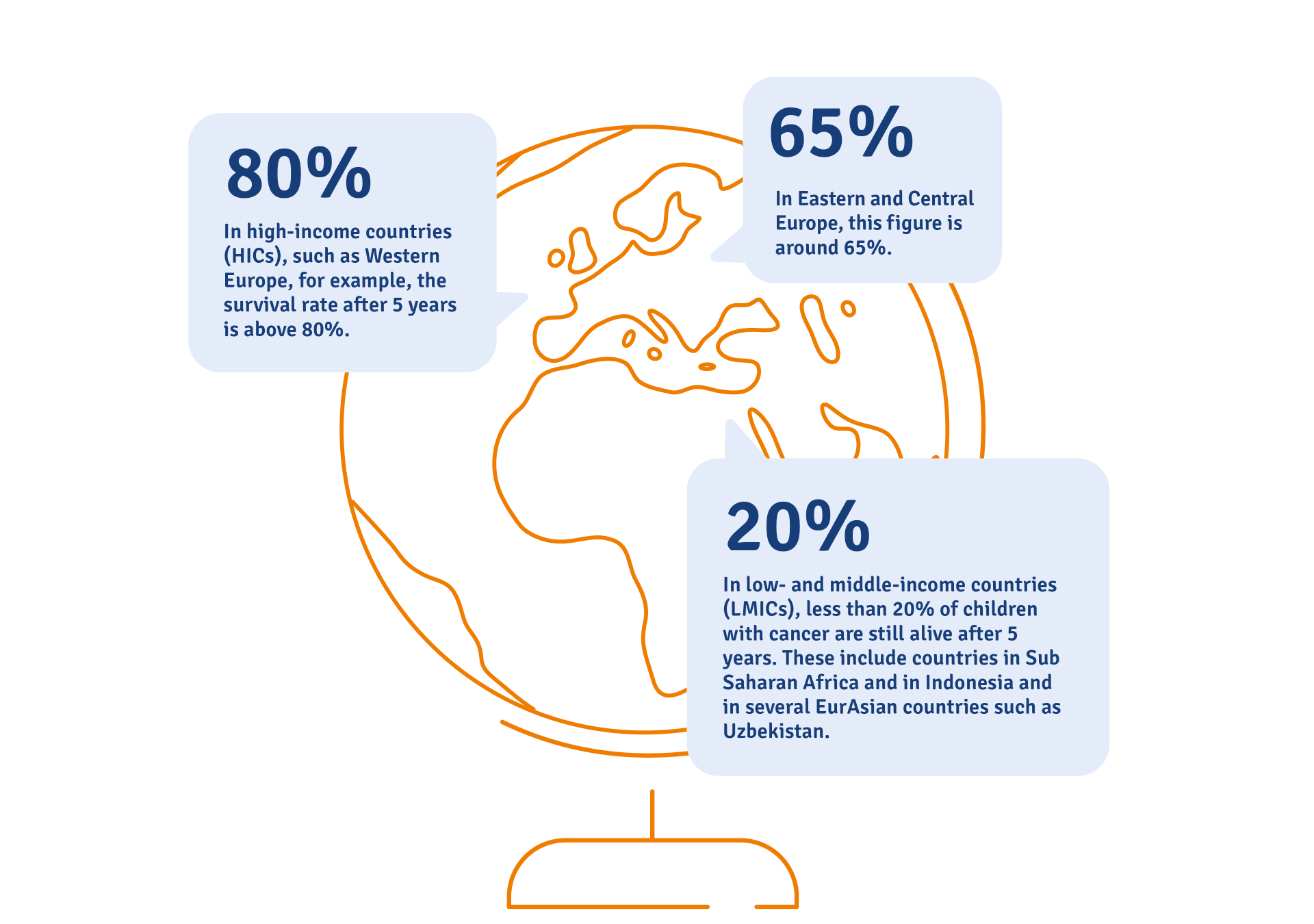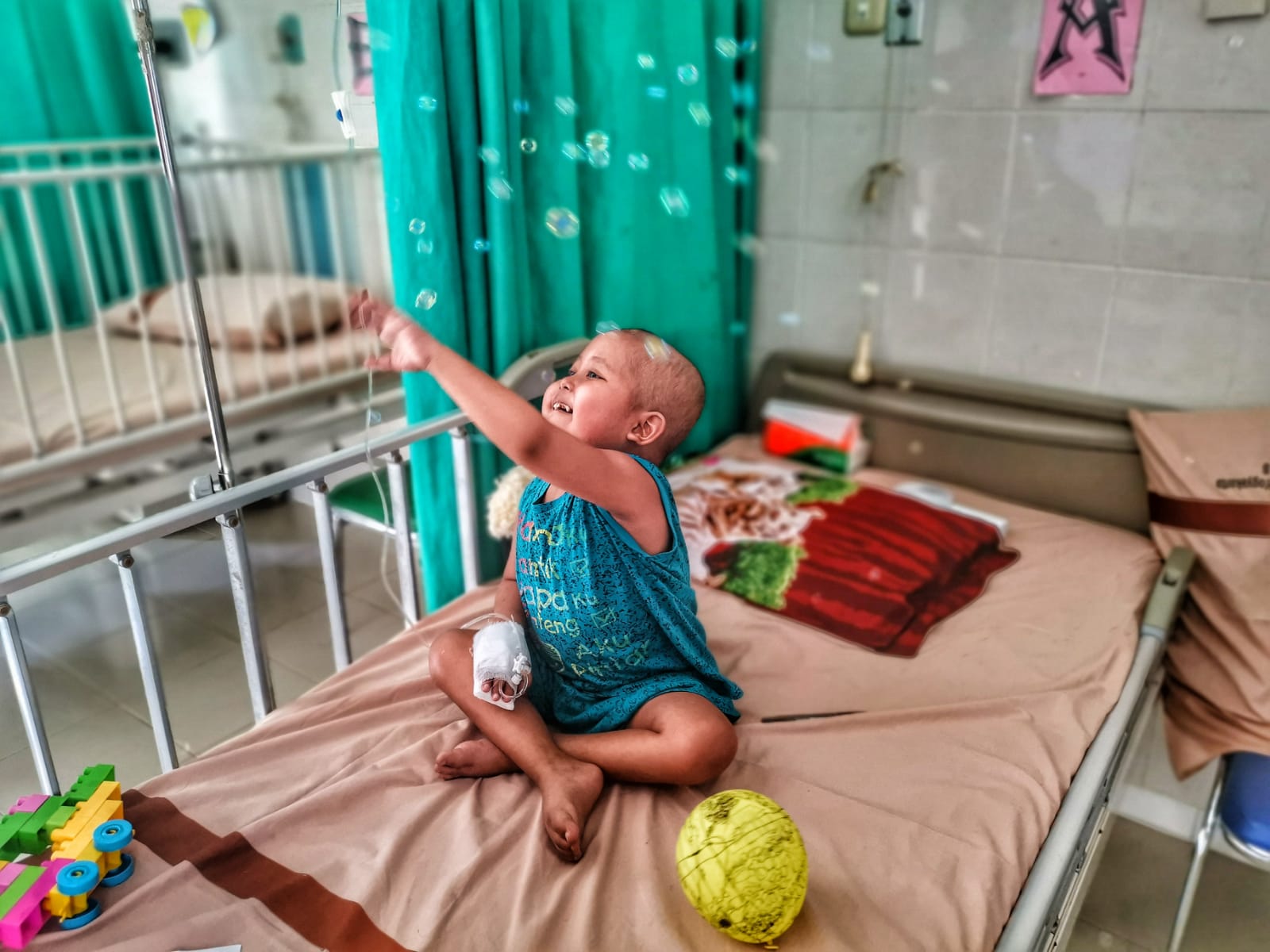Each year, more than 400,000 children around the world are diagnosed with cancer. In Europe, this number is around 25,000. In the Netherlands, about 600 children are affected every year. Childhood cancer occurs across the globe. But not all children have access to good care, timely treatment, or an accurate diagnosis. As a result, their chance of cure largely depends on the region and country they live in.

Máxima International aims to improve the quality of pediatric oncology care, education, and research through international collaborations and by representing the field in global policy and governance networks. For children with cancer worldwide. In doing so, we contribute to the mission of the Princess Máxima Center.
Put simply: we want more children with cancer to be cured in countries where survival rates are much lower than in the Netherlands. That is our goal. And as the largest pediatric oncology center in Europe, we also see it as our duty and responsibility. What’s more, children with cancer in the Netherlands also benefit from the international exchange of knowledge and expertise.
To achieve this goal, we focus on three priorities:
Through twinning partnerships, we support the development of pediatric oncology centers in partner countries, helping to raise the level of care and research. As a result, survival rates for children with cancer increase, and their quality of life improves. Our focus is on collaboration in Indonesia, Sub-Saharan Africa and Suriname, Eurasia, and Eastern, Central, and Southern Europe.
The twinning partnerships are the core activity of Máxima International. These are long-term collaborations with strategic partner institutes, formalized through a Memorandum of Understanding (MoU). In each MoU, we set out clear goals and expected outcomes in five key areas.
Not all twinning partners operate at the same level, but they are - or are becoming - the leading pediatric oncology centers in their respective countries.
These partnerships also help accelerate our (early) clinical trials and strengthen our international network.
It is essential for the Princess Máxima Center to be well represented in key global pediatric oncology bodies and organizations. This allows us to be involved early in international developments and to share knowledge and expertise from the outset. In turn, this contributes to improving pediatric oncology care and research worldwide.
Key organizations include the International Society of Pediatric Oncology (SIOP) and its European branch (SIOP Europe), the EU Cancer Mission Board, the World Health Organization (WHO), and major international pediatric oncology centers such as St. Jude Children’s Research Hospital. We already have strong ties and collaborations with all these organizations.
International positioning goes beyond representation at a governance level. It also includes the involvement of our care and research professionals in, for example, international tumor working groups.
Since its opening, the Máxima Center has treated a number of children from the Dutch Caribbean and Suriname. Ukrainian children have also been treated at our center since the start of the war in 2022. In addition, a small number of patients from various other countries come to the Máxima Center for (part of) their treatment.
In 2021, the Executive Board established a policy and growth model for international patients. One of the key principles of this policy is that Dutch patients must always retain their access to care and their place within the center.
At the end of 2021, the International Patient Office (IPO) was launched to coordinate the process for international patients. The IPO serves as the first point of contact for patients and parents, referring physicians, and pediatric oncologists at the Máxima Center for all international cases. It oversees the entire process: from registration, stay, and treatment to return home, including all medical and financial aspects.
The IPO also plays an important role in facilitating the participation of international patients in early-phase (phase I/II) clinical trials and coordinates requests for second opinions and the review of international cases in our tumor boards.
Máxima International is active in various countries around the world. Together with our twinning partners, we work to improve care and research for children with cancer and provide training and education on care and research to local professionals.
View world map
A crucial aspect of improving pediatric oncology care and research worldwide is knowledge sharing, learning, training, and professional development — in other words: global education. This includes on-site training of colleagues from partner centers by Máxima professionals, as well as internships at the Máxima Center for partner teams to learn how to work together in a multidisciplinary way.
An example of this is the Master Course, which professionals can attend in Utrecht or follow online. In some regions, the Master Course is also offered on location to improve accessibility.
We offer programs for pediatric oncologists, nurses, child life specialists, and researchers.
Research focuses both on pediatric oncology-specific topics and broader global health issues.
Research on pediatric oncology topics includes studies on the incidence, biology, treatment, and prognosis of specific diseases in different regions. It also involves pharmacokinetic research projects, participation of patients in phase I/II studies, as well as supportive care (such as infections, bleeding, psychosocial care, palliative care, and nutrition) and follow-up protocols after treatment.
Research on global health covers factors that are not specific to childhood cancer but have a broader impact on children, families, and society. This includes poverty, access to healthcare influenced by religion or culture, the structure and organization of healthcare systems, economic factors, and developments in digitalization and eHealth.
Naturally, local circumstances influence which types of research are relevant and feasible.
On this point, we make agreements to initiate data registration at partner centers, and to strengthen and sustain existing registries. Reliable, sustainable, and internationally comparable data registration enables proper evaluation of care, participation in international trials, and epidemiological analyses. This contributes to better treatment outcomes, policy development, and scientific understanding.
In practice, this often involves harmonizing data entry according to international standards and training data managers, healthcare professionals, and local trainers to work with data registration independently and sustainably. Strengthening existing software or implementing new systems is also often part of these agreements.
Advocacy involves lobbying on behalf of children with cancer and their families. At the local level, this may include engaging with hospital leadership where children are treated, as well as with local foundations involved in care or related areas. At the national level, it may concern the health insurance system, the ministry of health, or - if present - a national cancer institute. At the international level, advocacy efforts may target organizations such as the WHO, SIOP, and the EU.
Ultimately, advocacy helps improve access to quality care, encourages more and faster referrals, and supports earlier diagnosis. Better care also means minimizing - or ideally eliminating - the financial burden of a cancer diagnosis and treatment on families.
International collaboration is essential for the Princess Máxima Center to continue improving the quality of care, research, and education. It strengthens the Máxima Center’s mission: to cure every child with cancer, with the best possible quality of life — in the Netherlands and worldwide.
Would you like to learn more about our work to improve pediatric oncology care and research across the globe? Please contact: